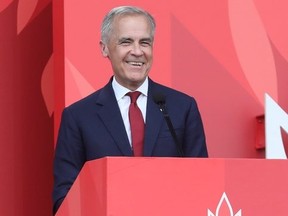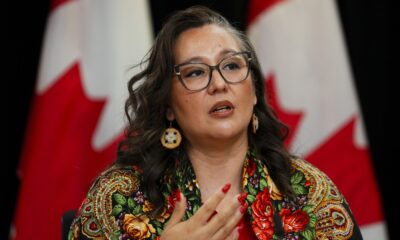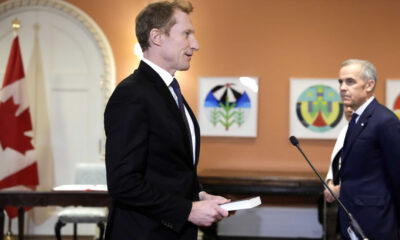Politics
Mark Carney’s Investment Portfolio Raises Ethical Concerns

Mark Carney, the newly appointed Prime Minister of Canada, is facing scrutiny over his investment portfolio, which includes stakes in major oil companies such as Chevron, Marathon, Occidental, and Valero. This revelation has sparked questions regarding potential conflicts of interest, particularly as Carney has been a vocal advocate for green energy and decarbonization. The details emerged following the release of his ethics disclosure last week.
Pressure mounted on Carney to disclose his investment holdings after he became leader of the Liberal Party and during the recent federal election. Despite initial resistance, he ultimately released his investment details, which reveal associations with over 100 companies, including Brookfield Asset Management and Stripe. Carney’s refusal to disclose his holdings earlier raised concerns about transparency and the integrity of his policy decisions.
In a pointed exchange with CBC journalist Rosemary Barton, Carney asserted that there were no conflicts of interest in his investments. “Look inside yourself, Rosemary,” he replied, challenging her assumption of a conflict. Nonetheless, the recent disclosure indicates that Carney must recuse himself from discussions and decisions involving the companies listed in his ethics forms, which cover a wide array of sectors, including oil and natural gas.
Carney’s investment portfolio is not limited to conventional energy. It also includes substantial interests in green energy companies, aligning with his ambition to position Canada as a leader in the green energy sector. Despite his commitment to sustainability, many companies in which he has invested fall under the purview of his ethical obligations, complicating his ability to make impartial decisions regarding energy development.
Among the companies listed in his portfolio are significant American financial institutions such as Bank of America, Citigroup, and JPMorgan Chase. Notably absent from his disclosure are shares in major Canadian banks like TD Bank and BMO, which are key players in the Canadian financial landscape. Carney’s investments also extend to airlines, with shares in American Airlines, Delta, Southwest, and United, while notably lacking any stake in Air Canada.
A review of Carney’s investment strategy prior to his political career reveals a distinct lack of Canadian assets. He has invested in multinational corporations like Airbnb, Amazon, and Uber, which could have been impacted by Canada’s proposed Digital Services Tax. The tax was suspended shortly before its implementation, raising further questions about whether Carney, who previously served on Stripe’s board, was in a position to benefit from the decision to halt the tax.
The uncertainty surrounding Carney’s investments raises critical questions about government transparency and ethical governance. As he navigates his role as Prime Minister, the public is left wondering how much influence his financial interests may have on his policy decisions. The current rules governing ethical disclosures are seen by many as inadequate, emphasizing the need for reforms to ensure that public officials are held to higher standards of transparency.
Clarifying his financial interests and the extent of his investments could alleviate concerns about conflicts of interest. Without such transparency, Canadians may struggle to trust that their Prime Minister is acting in the nation’s best interests rather than his own financial gain.
As discussions about ethical governance continue, Carney’s situation serves as a reminder of the importance of openness in public service. The public expects leaders to prioritize the collective good over personal financial interests, and the onus is on Carney to demonstrate that he can do just that.
-

 Politics4 weeks ago
Politics4 weeks agoSecwepemc First Nation Seeks Aboriginal Title Over Kamloops Area
-

 World5 months ago
World5 months agoScientists Unearth Ancient Antarctic Ice to Unlock Climate Secrets
-

 Entertainment5 months ago
Entertainment5 months agoTrump and McCormick to Announce $70 Billion Energy Investments
-

 Science5 months ago
Science5 months agoFour Astronauts Return to Earth After International Space Station Mission
-

 Lifestyle5 months ago
Lifestyle5 months agoTransLink Launches Food Truck Program to Boost Revenue in Vancouver
-

 Technology3 months ago
Technology3 months agoApple Notes Enhances Functionality with Markdown Support in macOS 26
-

 Lifestyle3 months ago
Lifestyle3 months agoManitoba’s Burger Champion Shines Again Amid Dining Innovations
-

 Top Stories2 months ago
Top Stories2 months agoUrgent Update: Fatal Crash on Highway 99 Claims Life of Pitt Meadows Man
-

 Politics4 months ago
Politics4 months agoUkrainian Tennis Star Elina Svitolina Faces Death Threats Online
-

 Sports5 months ago
Sports5 months agoSearch Underway for Missing Hunter Amid Hokkaido Bear Emergency
-

 Politics5 months ago
Politics5 months agoCarney Engages First Nations Leaders at Development Law Summit
-

 Technology5 months ago
Technology5 months agoFrosthaven Launches Early Access on July 31, 2025




















